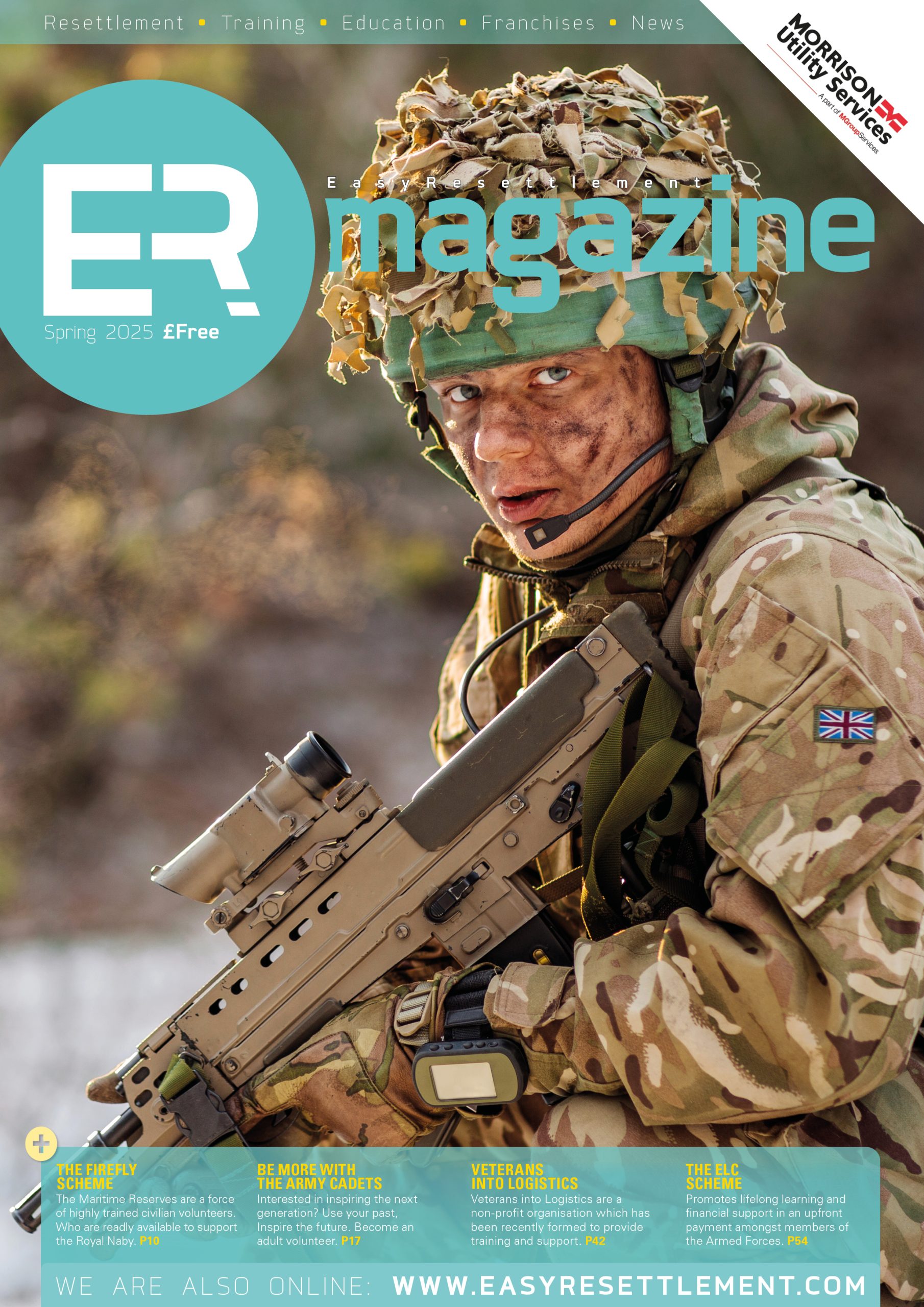Chief of Defence People
I took on the role of Chief of Defence People (CDP) just as the pandemic was beginning to grip the world in February.
As you can imagine, this has meant that the last few months in post have brought some interesting and unexpected challenges as we all get used to this new way of life. While some aspects of the ways in which we work have changed drastically in recent months, the crucial role of our people has remained constant. They are more invaluable and essential to Defence outputs than ever before in these challenging, uncertain times.
As CDP I am in the privileged position of being able see this first-hand. I set the strategy for developing a capable and motivated military and civilian workforce, and I am responsible for all people in Defence, covering over 200,000 servicemen and women, and nearly 60,000 civil servants. With that comes the opportunity to make sure that our people are supported, developed and engaged throughout their careers and beyond.
I plan to build on the successes of my predecessor, Lieutenant General Richard Nugee, by continuing to improve the offer and by working with the single Services to increase the recruitment and retention of Service personnel. We can achieve this by developing a workforce that is drawn from the society we represent, that reflects the demands of the modern world we operate in, and by maximising the use of talent across the military and civilian workforce. We want to ensure that people’s talents are developed and used where they are needed most, as well as giving them more opportunity to shape their own career paths. We must also make sure that those transitioning to new roles, or into civilian life, have been given access to the tools and support they need to prepare for their next chapter. This is an area that has seen much improvement in recent years, but I know that there is always more that can be done.
Supporting Service leavers
Rapid changes to our ways of working have accelerated our digital transformation and improved our ability to adapt to different ways of conducting business. We know that access to CTP services has been impacted, and we have reacted by extending the entitlement by three months to 27 months post discharge, so Service leavers and veterans are not adversely affected.
In addition to this, we’ve made sure that the Core Resettlement Programme (CRP) and Employment Support Programme (ESP) will also be entitled to an extra three months access to CTP services post discharge. We have also ensured that initiatives such as CTP Future Horizons can be accessed online and by email when face to face meetings are not available.
Complementing this Whole Force approach, the single Services have developed their own interim policies to allow certain Service leavers to extend their service or retract Notice to Terminate. We believe this is vital in order to retain talent and provide certainty for those who are about to leave in uncertain times.
We have also looked closely at what we can do to minimise the impact on those accessing Enhanced Learning Credits. As part of this work we have automated the process for Claim Cancellations, which should make the cancellation process more streamlined. Those who are already in their resettlement phase who cannot receive reimbursement of course fees will also be able to claim back any personal contribution once they provide necessary evidence.
These are just some of the steps we have taken to reduce the impact on our Service leavers and veterans, but we’re acutely aware that the situation with Covid-19 is ever evolving, and the changes I’ve outlined here are in no means the only action we have taken. Any Service personnel looking for more detailed personal guidance should speak to their unit Chain of Command for further direction and support.
Keeping up with the pace of change
This work is more important than ever as the world in which we operate is changing at a faster rate than ever before. We must be ready to recognise, understand and respond to the pace of change, and our success in meeting this challenge depends on our people. Given the situation we find ourselves in, making sure that we are providing the right interventions, at the right time, is crucial.
Making sure that those who are leaving the Armed Forces can – and do – access the services they are entitled to is an essential element of the Defence People Team’s work. The UK employment market will undoubtedly be affected by the fallout of Covid-19 in the coming months and Service leavers will understandably be concerned. The MOD and the single Services are working hard to implement temporary emergency policies to address the issues which we are all having to navigate at this unprecedented time.
While this is undoubtedly a challenge, necessity is the mother of invention and Covid-19 and its constraints has increased the pace and scale of innovation. My team have already introduced policy changes and actions to ensure that Service leavers are not disadvantaged. This includes developing new direction and guidance for Career Transition Partnership (CTP) and Enhanced Learning Credit (ELC) policy.
Lt Gen James Swift,
Chief of Defence People
The importance of mental fitness
Another area where we are ramping up our efforts is in the provision of mental health support; particularly given the challenges we are currently facing. While many across the UK, and indeed the world, are getting used to working from home, many in the Armed Forces continue to go to work to play their part in protecting the nation. We must do all that we can to ensure that both cohorts are adequately supported both in terms of the tools, resources and training required to do their jobs, as well as the necessary support for their health and wellbeing.
The crux of this work is in making sure that Service personnel have access to the right level of mental health support both during and after their service. As members of the Armed Forces we are only too aware of how important it is to look after our physical fitness. Whether maintaining peak condition for active service, trying to keep in shape as we transition to life after the Forces, or even undergoing rehabilitation, we know that physical fitness is key. It’s vital that we give the same consideration to our mental fitness, as it affects the way we think, feel and respond to others in both our professional and personal lives.
As the Chief of Defence People, I’m responsible for the wellbeing of our Armed Forces. I’m acutely aware that without proper mental fitness, we can’t expect our people to serve to the best of their ability, and of the impacts this can have on personnel once they leave. Defence has an obligation to provide the right support.
In April 2020, we launched HeadFIT, an online platform that provides our people with the resources to help form healthy habits and take a proactive approach to management of mental health. HeadFIT is designed specifically for the Armed Forces, providing 24/7 access to self-help tools that can enhance mood, drive and confidence, and help manage the stresses of everyday life. It has been designed to complement existing and emerging Mental Fitness and Resilience initiatives from each of the single Services, including formal training interventions.
The platform has a range of tools, including, breathing exercises, body posture and relaxation techniques that have been designed for everyone across Defence. Whether you are a new recruit, long-serving personnel, a veteran or recent service leaver, civilian staff, or currently serving in uniform the techniques can be easily integrated into your everyday life, creating positive mental health habits.
The development of this service is the result of a partnership with The Royal Foundation’s Heads Together campaign, the Ministry of Defence, Kings College London, with clinical advice from Dr Vanessa Moulton, and has been spearheaded by The Duke of Sussex.
HeadFIT aims to enhance and support the existing and future mental health and resilience initiatives available to all our people and is one of many tools now available to those looking for help with their mental health. The Army’s OPSMART programme is a flagship for mental resilience training and wider mental health support. The Royal Marines have developed their own resilience programme, REGAIN; the Navy has appointed dedicated psychiatric nurses to support Flotillas; and the RAF continues to develop its Thriving at Work programme. All our civil servants have access to the ‘health assured’ Employment Assistance Programme, providing emotional support 24/7.
On a wider scale, Defence has also recently signed up to the ‘Thriving at Work’ standards, and Defence people continue to have access to a wealth of Defence charities and mental health networks. We hope that, as part of the suite of mental health support offered by the MOD, HeadFIT will provide our people with the tools they need to maintain their mental fitness throughout their career and beyond.
Originally scheduled to launch in June 2020, the launch was brought forward to provide Defence staff with the support they deserve during the Covid-19 pandemic and to help them adapt to new challenges and working environments.
What has become clear to me in my first few months in post as CDP is that in Defence we recognise more than ever that the world of work is changing quickly, and that we must adapt flexibly and quickly to keep up. Our people, civilians, Service personnel, their families and veterans are the most important component of Defence and the reason I serve. They have always been the critical factor of Defence capability and will continue to be in the 21st Century as we transform to ensure we retain our edge.

